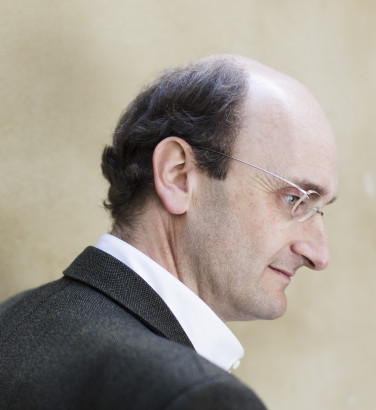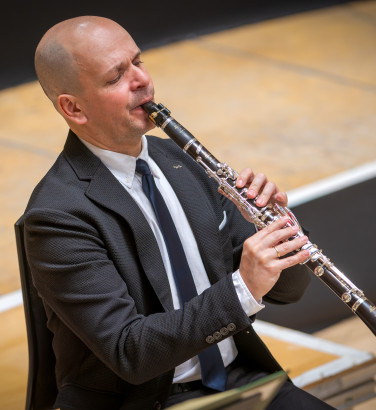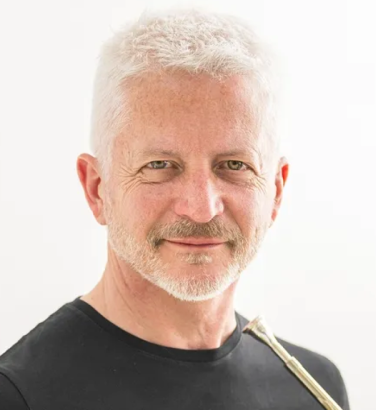
Andrew Manze: "A Principal Guest Conductor should complement the work of the Chief"
8 Apr 2024
News Story
Conductor Andrew Manze has built a warm relationship with the Orchestra over the past few years, and it was a joy to welcome him back for a pair of concerts in our 50th Anniversary Season. The second of these was devoted to Vaughan Williams, with whose music he is closely associated, so we are delighted that Andrew agreed to a short interview shedding light on a composer who is sometimes still underrated.
Given his fascination for music of the Tudor period and old English folk tunes, it’s easy to think of Vaughan Williams as a backward-looking composer. What makes him a visionary?
Vaughan Williams came of age at a time of bewildering variety and change in the world of music. He was born within ten years of Richard Strauss, Debussy, Stravinsky, Schönberg and Webern, and while he was well aware of their innovations, he followed none of them. Instead he quietly blazed his own trail, finding that distinctive, pastoral voice by digging down to explore his (and our) cultural roots. His source materials included folk songs and dances, the church tunes he edited for The English Hymnal, the Renaissance masters, and the writings of Milton and Shakespeare, Thomas Hardy and William Blake. Add to the mix a soft heart, deeply affected by unspeakable experiences as an ambulance driver in the Great War, and the result is indeed visionary but also accessible.
What has your experience been of conducting Vaughan Williams abroad? He seems to be among those British composers whose music doesn’t always travel well.
It is a humbling and moving experience to bring Vaughan Williams’ music to an orchestra unfamiliar with him and then feel how the atmosphere in the rehearsal room shifts from polite, dutiful curiosity to downright admiration and enthusiasm. I remember the Amsterdam Concertgebouw playing the sublime Fifth Symphony for the first time, the epic Ninth with the Swedish Radio Orchestra, the devastating, post-apocalyptic Sixth with the North German Radio Philharmonic. (That last orchestra invited me to be its Chief Conductor immediately afterwards, so thank you, VW!)
I never talk up this music because it is British but because it is of the highest quality, and I am yet to find an unresponsive orchestra or audience. In fact what I normally hear after a concert is ‘why didn’t we know this great music before?’ and ‘how much more is there?'
[My] first experience of playing in an orchestra involved desperate floundering around while the music whizzed by.
Vaughan Williams inevitably dominates the English pastoral style. Are there any of his contemporaries you feel are ripe for rediscovery, and any of their works you would particularly highlight?
I am by no means the first to highlight these three composers but recently I have had the pleasure of getting to know the music of Doreen Carwithen, which impressed Vaughan Williams greatly, and of Ruth Gipps and Grace Williams, both his pupils. I hope we all get the chance to hear more of their music, and not only their lovely miniatures but the more substantial chamber music, concertos and symphonies.
How does the Concerto Grosso stand out from the (admittedly) few works designed for performance by professionals alongside much less experienced players?
I am sure I’m not the only one whose first experience of playing in an orchestra involved desperate floundering around while the music whizzed by. I wish we’d been playing Vaughan Williams’ ingenious Concerto Grosso. There’s perhaps not another piece quite like it - a 'real' piece of music, uncompromising in its seriousness, and yet it gives everyone involved, whatever their proficiency or experience, an important and fulfilling role. Every ‘Grade' is represented, from the near beginner, using only their four open strings, to a Grade 8+ professional, with absolutely no 'dumbing down’ to either players or listeners.
Finally, as the SCO’s newly-appointed Principal Guest Conductor, is there any other repertoire you’d be especially keen to explore with the Orchestra?
For as long as I can remember, the SCO has offered an impressive and interesting variety of music. Planning programmes with [Concerts Director] Judith Colman and [Chief Executive] Gavin Reid is always a pleasure as we exchange ideas and infect each other with our enthusiasms. (They chivvied me into doing my first Dvořák symphony, and I thank them for it.) So I look forward to more adventures, whether it be Haydn symphonies (is there a bad one?), the obscure British and Scandinavian composers that interest me, or brand new works. And a Principal Guest Conductor should also complement the work of the Chief, so I am happy to roam in those musical territories that the brilliant Maxim Emelyanychev has not yet had time for.
Related Stories
![]()
Andrew Manze: "I've always loved Viennese waltzes and polkas"
1 December 2025
Our Principal Guest Conductor is really looking forward to conducting our Viennese New Year concerts!![]()
Maximiliano Martín: "A friend said 'Gnarly Buttons would suit you very well'"
10 November 2025
Ahead of his performance of John Adams' Gnarly Buttons, we spoke to our Principal Clarinet about performing as soloist with the Orchestra.![]()
Quickfire Questions with Kenneth Henderson
7 November 2025
Get to know our new Principal Horn!


